EPDM83 - Theories and Ideologies: Impact on Educator Good Practice
VerifiedAdded on 2023/04/20
|21
|6610
|391
Essay
AI Summary
This essay critically explores, analyzes, and evaluates how theories and ideologies influence good practice for educators, focusing on behaviorism, cognitivism, and constructivism. It discusses the impact of educators on student achievement, the different types of education (formal, informal, and non-formal), and the qualities of effective educators. The essay also delves into the role of learning theories in shaping educational practices and examines the significance of these theories in promoting effective teaching methods. The author shares practical experience as a grade 2 primary school teacher in China, highlighting the unique aspects of the Chinese education system and its emphasis on compulsory education. The evaluation systems for educators are also discussed, emphasizing the importance of understanding student requirements and aligning achievement tests with curriculum goals. Desklib provides students access to this comprehensive essay and a wealth of other educational resources.
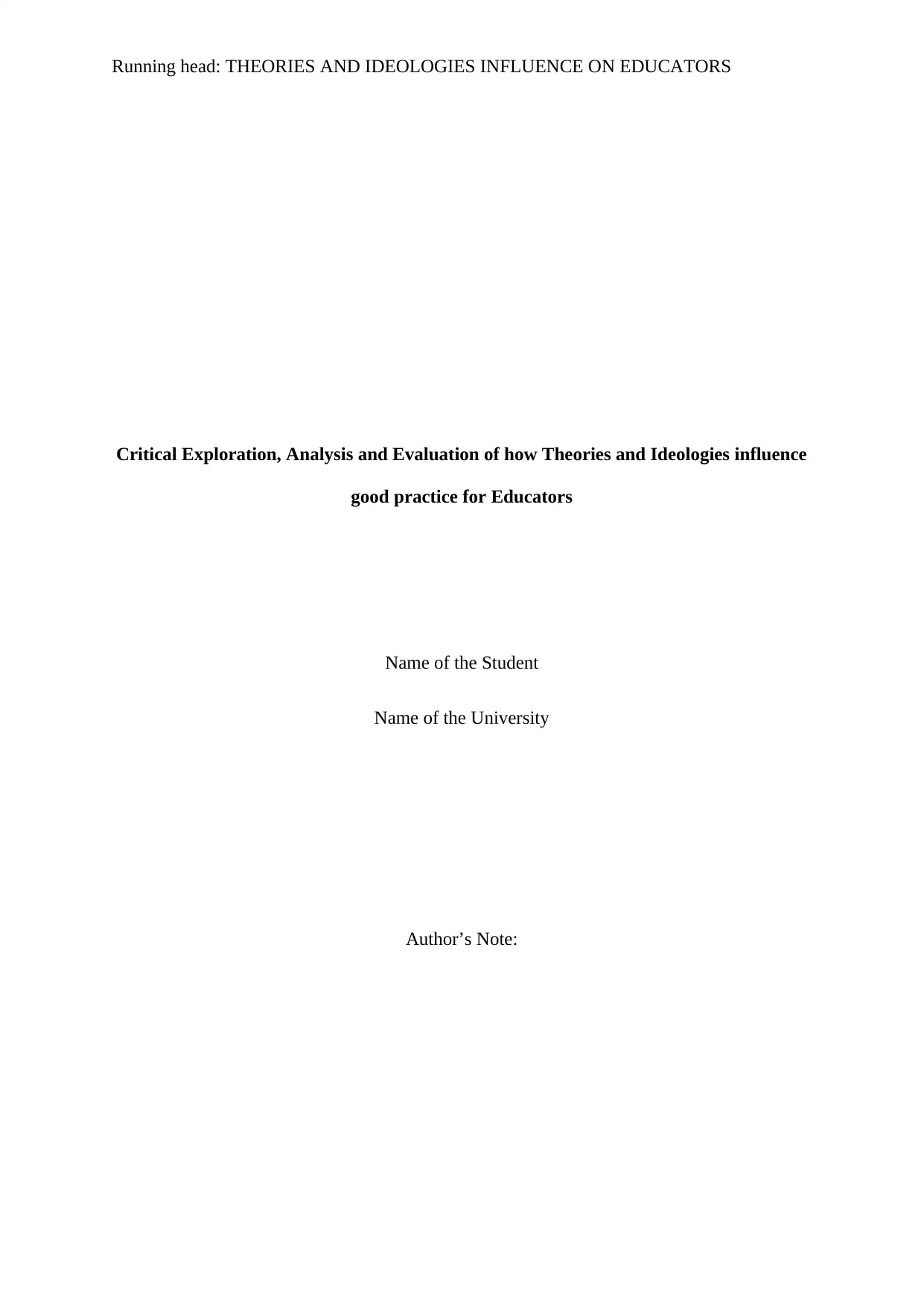
Running head: THEORIES AND IDEOLOGIES INFLUENCE ON EDUCATORS
Critical Exploration, Analysis and Evaluation of how Theories and Ideologies influence
good practice for Educators
Name of the Student
Name of the University
Author’s Note:
Critical Exploration, Analysis and Evaluation of how Theories and Ideologies influence
good practice for Educators
Name of the Student
Name of the University
Author’s Note:
Paraphrase This Document
Need a fresh take? Get an instant paraphrase of this document with our AI Paraphraser
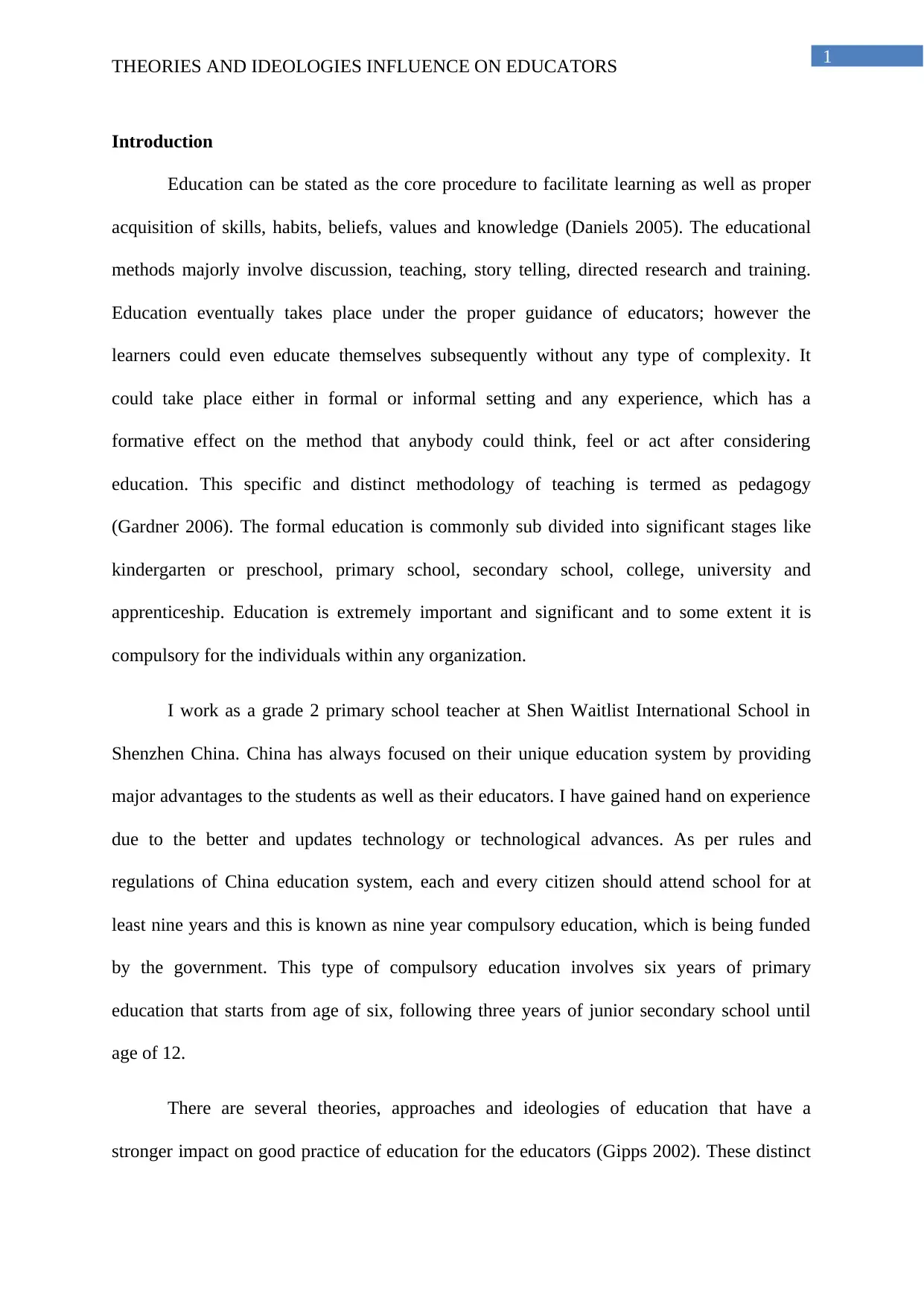
1
THEORIES AND IDEOLOGIES INFLUENCE ON EDUCATORS
Introduction
Education can be stated as the core procedure to facilitate learning as well as proper
acquisition of skills, habits, beliefs, values and knowledge (Daniels 2005). The educational
methods majorly involve discussion, teaching, story telling, directed research and training.
Education eventually takes place under the proper guidance of educators; however the
learners could even educate themselves subsequently without any type of complexity. It
could take place either in formal or informal setting and any experience, which has a
formative effect on the method that anybody could think, feel or act after considering
education. This specific and distinct methodology of teaching is termed as pedagogy
(Gardner 2006). The formal education is commonly sub divided into significant stages like
kindergarten or preschool, primary school, secondary school, college, university and
apprenticeship. Education is extremely important and significant and to some extent it is
compulsory for the individuals within any organization.
I work as a grade 2 primary school teacher at Shen Waitlist International School in
Shenzhen China. China has always focused on their unique education system by providing
major advantages to the students as well as their educators. I have gained hand on experience
due to the better and updates technology or technological advances. As per rules and
regulations of China education system, each and every citizen should attend school for at
least nine years and this is known as nine year compulsory education, which is being funded
by the government. This type of compulsory education involves six years of primary
education that starts from age of six, following three years of junior secondary school until
age of 12.
There are several theories, approaches and ideologies of education that have a
stronger impact on good practice of education for the educators (Gipps 2002). These distinct
THEORIES AND IDEOLOGIES INFLUENCE ON EDUCATORS
Introduction
Education can be stated as the core procedure to facilitate learning as well as proper
acquisition of skills, habits, beliefs, values and knowledge (Daniels 2005). The educational
methods majorly involve discussion, teaching, story telling, directed research and training.
Education eventually takes place under the proper guidance of educators; however the
learners could even educate themselves subsequently without any type of complexity. It
could take place either in formal or informal setting and any experience, which has a
formative effect on the method that anybody could think, feel or act after considering
education. This specific and distinct methodology of teaching is termed as pedagogy
(Gardner 2006). The formal education is commonly sub divided into significant stages like
kindergarten or preschool, primary school, secondary school, college, university and
apprenticeship. Education is extremely important and significant and to some extent it is
compulsory for the individuals within any organization.
I work as a grade 2 primary school teacher at Shen Waitlist International School in
Shenzhen China. China has always focused on their unique education system by providing
major advantages to the students as well as their educators. I have gained hand on experience
due to the better and updates technology or technological advances. As per rules and
regulations of China education system, each and every citizen should attend school for at
least nine years and this is known as nine year compulsory education, which is being funded
by the government. This type of compulsory education involves six years of primary
education that starts from age of six, following three years of junior secondary school until
age of 12.
There are several theories, approaches and ideologies of education that have a
stronger impact on good practice of education for the educators (Gipps 2002). These distinct
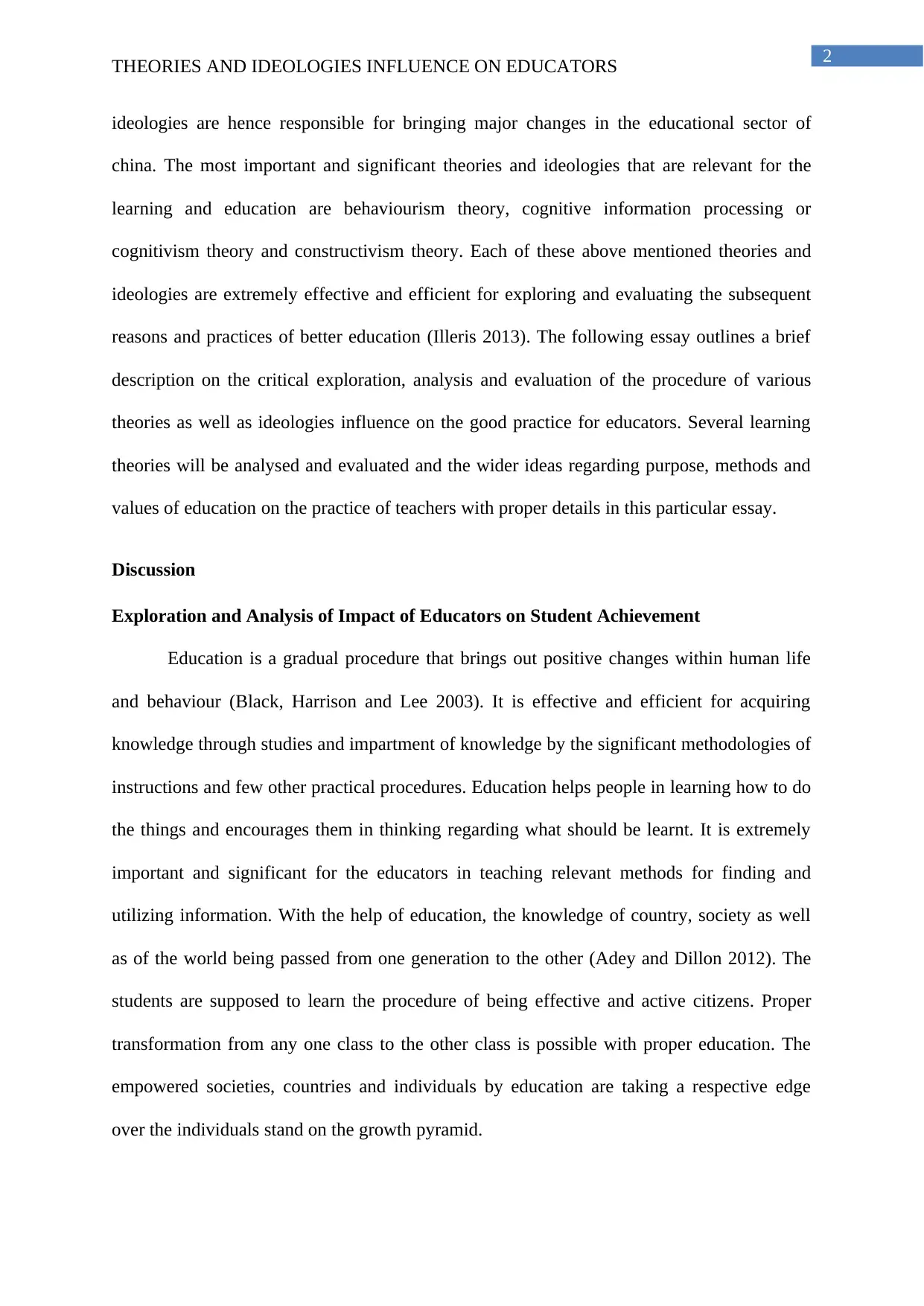
2
THEORIES AND IDEOLOGIES INFLUENCE ON EDUCATORS
ideologies are hence responsible for bringing major changes in the educational sector of
china. The most important and significant theories and ideologies that are relevant for the
learning and education are behaviourism theory, cognitive information processing or
cognitivism theory and constructivism theory. Each of these above mentioned theories and
ideologies are extremely effective and efficient for exploring and evaluating the subsequent
reasons and practices of better education (Illeris 2013). The following essay outlines a brief
description on the critical exploration, analysis and evaluation of the procedure of various
theories as well as ideologies influence on the good practice for educators. Several learning
theories will be analysed and evaluated and the wider ideas regarding purpose, methods and
values of education on the practice of teachers with proper details in this particular essay.
Discussion
Exploration and Analysis of Impact of Educators on Student Achievement
Education is a gradual procedure that brings out positive changes within human life
and behaviour (Black, Harrison and Lee 2003). It is effective and efficient for acquiring
knowledge through studies and impartment of knowledge by the significant methodologies of
instructions and few other practical procedures. Education helps people in learning how to do
the things and encourages them in thinking regarding what should be learnt. It is extremely
important and significant for the educators in teaching relevant methods for finding and
utilizing information. With the help of education, the knowledge of country, society as well
as of the world being passed from one generation to the other (Adey and Dillon 2012). The
students are supposed to learn the procedure of being effective and active citizens. Proper
transformation from any one class to the other class is possible with proper education. The
empowered societies, countries and individuals by education are taking a respective edge
over the individuals stand on the growth pyramid.
THEORIES AND IDEOLOGIES INFLUENCE ON EDUCATORS
ideologies are hence responsible for bringing major changes in the educational sector of
china. The most important and significant theories and ideologies that are relevant for the
learning and education are behaviourism theory, cognitive information processing or
cognitivism theory and constructivism theory. Each of these above mentioned theories and
ideologies are extremely effective and efficient for exploring and evaluating the subsequent
reasons and practices of better education (Illeris 2013). The following essay outlines a brief
description on the critical exploration, analysis and evaluation of the procedure of various
theories as well as ideologies influence on the good practice for educators. Several learning
theories will be analysed and evaluated and the wider ideas regarding purpose, methods and
values of education on the practice of teachers with proper details in this particular essay.
Discussion
Exploration and Analysis of Impact of Educators on Student Achievement
Education is a gradual procedure that brings out positive changes within human life
and behaviour (Black, Harrison and Lee 2003). It is effective and efficient for acquiring
knowledge through studies and impartment of knowledge by the significant methodologies of
instructions and few other practical procedures. Education helps people in learning how to do
the things and encourages them in thinking regarding what should be learnt. It is extremely
important and significant for the educators in teaching relevant methods for finding and
utilizing information. With the help of education, the knowledge of country, society as well
as of the world being passed from one generation to the other (Adey and Dillon 2012). The
students are supposed to learn the procedure of being effective and active citizens. Proper
transformation from any one class to the other class is possible with proper education. The
empowered societies, countries and individuals by education are taking a respective edge
over the individuals stand on the growth pyramid.
⊘ This is a preview!⊘
Do you want full access?
Subscribe today to unlock all pages.

Trusted by 1+ million students worldwide
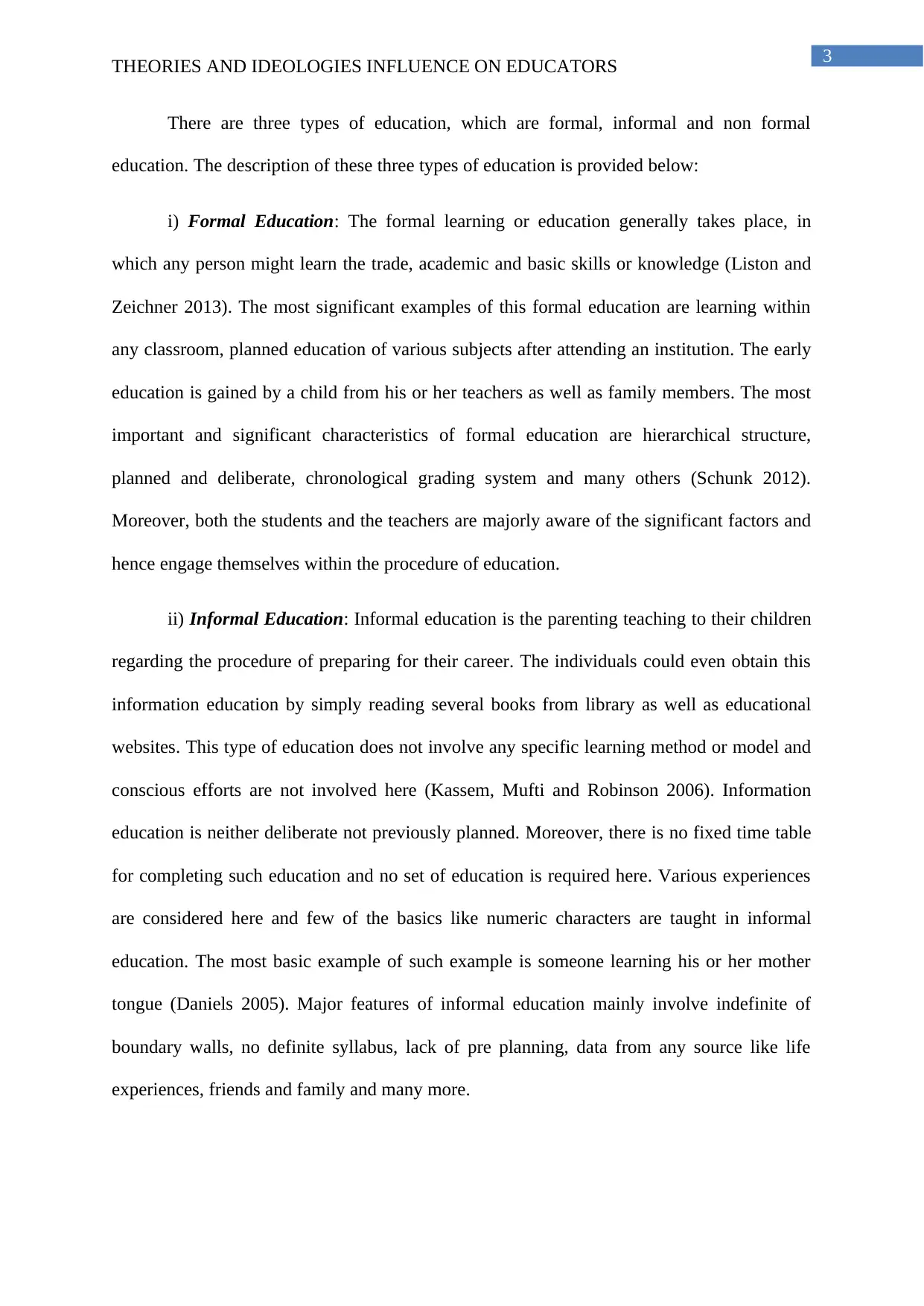
3
THEORIES AND IDEOLOGIES INFLUENCE ON EDUCATORS
There are three types of education, which are formal, informal and non formal
education. The description of these three types of education is provided below:
i) Formal Education: The formal learning or education generally takes place, in
which any person might learn the trade, academic and basic skills or knowledge (Liston and
Zeichner 2013). The most significant examples of this formal education are learning within
any classroom, planned education of various subjects after attending an institution. The early
education is gained by a child from his or her teachers as well as family members. The most
important and significant characteristics of formal education are hierarchical structure,
planned and deliberate, chronological grading system and many others (Schunk 2012).
Moreover, both the students and the teachers are majorly aware of the significant factors and
hence engage themselves within the procedure of education.
ii) Informal Education: Informal education is the parenting teaching to their children
regarding the procedure of preparing for their career. The individuals could even obtain this
information education by simply reading several books from library as well as educational
websites. This type of education does not involve any specific learning method or model and
conscious efforts are not involved here (Kassem, Mufti and Robinson 2006). Information
education is neither deliberate not previously planned. Moreover, there is no fixed time table
for completing such education and no set of education is required here. Various experiences
are considered here and few of the basics like numeric characters are taught in informal
education. The most basic example of such example is someone learning his or her mother
tongue (Daniels 2005). Major features of informal education mainly involve indefinite of
boundary walls, no definite syllabus, lack of pre planning, data from any source like life
experiences, friends and family and many more.
THEORIES AND IDEOLOGIES INFLUENCE ON EDUCATORS
There are three types of education, which are formal, informal and non formal
education. The description of these three types of education is provided below:
i) Formal Education: The formal learning or education generally takes place, in
which any person might learn the trade, academic and basic skills or knowledge (Liston and
Zeichner 2013). The most significant examples of this formal education are learning within
any classroom, planned education of various subjects after attending an institution. The early
education is gained by a child from his or her teachers as well as family members. The most
important and significant characteristics of formal education are hierarchical structure,
planned and deliberate, chronological grading system and many others (Schunk 2012).
Moreover, both the students and the teachers are majorly aware of the significant factors and
hence engage themselves within the procedure of education.
ii) Informal Education: Informal education is the parenting teaching to their children
regarding the procedure of preparing for their career. The individuals could even obtain this
information education by simply reading several books from library as well as educational
websites. This type of education does not involve any specific learning method or model and
conscious efforts are not involved here (Kassem, Mufti and Robinson 2006). Information
education is neither deliberate not previously planned. Moreover, there is no fixed time table
for completing such education and no set of education is required here. Various experiences
are considered here and few of the basics like numeric characters are taught in informal
education. The most basic example of such example is someone learning his or her mother
tongue (Daniels 2005). Major features of informal education mainly involve indefinite of
boundary walls, no definite syllabus, lack of pre planning, data from any source like life
experiences, friends and family and many more.
Paraphrase This Document
Need a fresh take? Get an instant paraphrase of this document with our AI Paraphraser
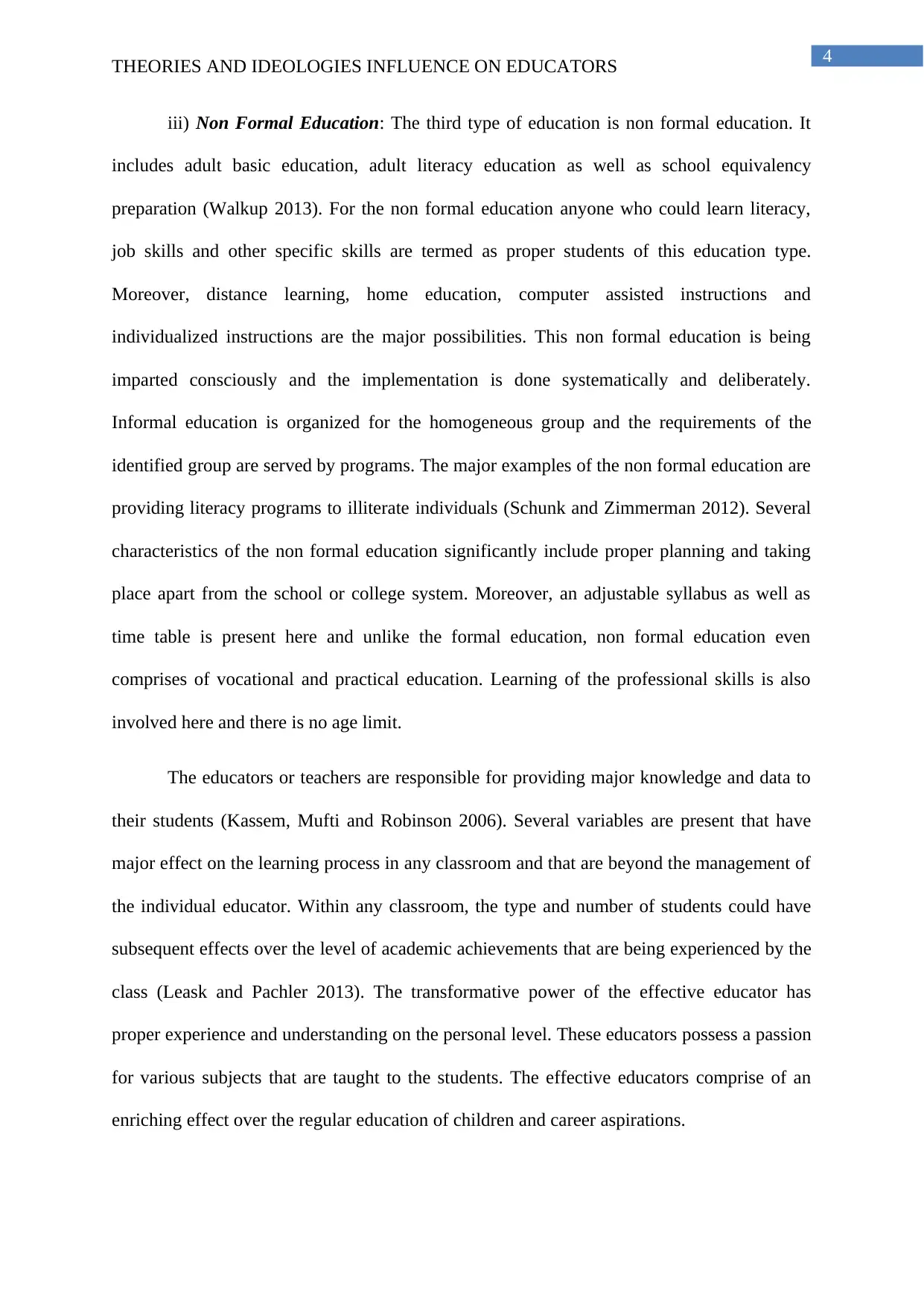
4
THEORIES AND IDEOLOGIES INFLUENCE ON EDUCATORS
iii) Non Formal Education: The third type of education is non formal education. It
includes adult basic education, adult literacy education as well as school equivalency
preparation (Walkup 2013). For the non formal education anyone who could learn literacy,
job skills and other specific skills are termed as proper students of this education type.
Moreover, distance learning, home education, computer assisted instructions and
individualized instructions are the major possibilities. This non formal education is being
imparted consciously and the implementation is done systematically and deliberately.
Informal education is organized for the homogeneous group and the requirements of the
identified group are served by programs. The major examples of the non formal education are
providing literacy programs to illiterate individuals (Schunk and Zimmerman 2012). Several
characteristics of the non formal education significantly include proper planning and taking
place apart from the school or college system. Moreover, an adjustable syllabus as well as
time table is present here and unlike the formal education, non formal education even
comprises of vocational and practical education. Learning of the professional skills is also
involved here and there is no age limit.
The educators or teachers are responsible for providing major knowledge and data to
their students (Kassem, Mufti and Robinson 2006). Several variables are present that have
major effect on the learning process in any classroom and that are beyond the management of
the individual educator. Within any classroom, the type and number of students could have
subsequent effects over the level of academic achievements that are being experienced by the
class (Leask and Pachler 2013). The transformative power of the effective educator has
proper experience and understanding on the personal level. These educators possess a passion
for various subjects that are taught to the students. The effective educators comprise of an
enriching effect over the regular education of children and career aspirations.
THEORIES AND IDEOLOGIES INFLUENCE ON EDUCATORS
iii) Non Formal Education: The third type of education is non formal education. It
includes adult basic education, adult literacy education as well as school equivalency
preparation (Walkup 2013). For the non formal education anyone who could learn literacy,
job skills and other specific skills are termed as proper students of this education type.
Moreover, distance learning, home education, computer assisted instructions and
individualized instructions are the major possibilities. This non formal education is being
imparted consciously and the implementation is done systematically and deliberately.
Informal education is organized for the homogeneous group and the requirements of the
identified group are served by programs. The major examples of the non formal education are
providing literacy programs to illiterate individuals (Schunk and Zimmerman 2012). Several
characteristics of the non formal education significantly include proper planning and taking
place apart from the school or college system. Moreover, an adjustable syllabus as well as
time table is present here and unlike the formal education, non formal education even
comprises of vocational and practical education. Learning of the professional skills is also
involved here and there is no age limit.
The educators or teachers are responsible for providing major knowledge and data to
their students (Kassem, Mufti and Robinson 2006). Several variables are present that have
major effect on the learning process in any classroom and that are beyond the management of
the individual educator. Within any classroom, the type and number of students could have
subsequent effects over the level of academic achievements that are being experienced by the
class (Leask and Pachler 2013). The transformative power of the effective educator has
proper experience and understanding on the personal level. These educators possess a passion
for various subjects that are taught to the students. The effective educators comprise of an
enriching effect over the regular education of children and career aspirations.
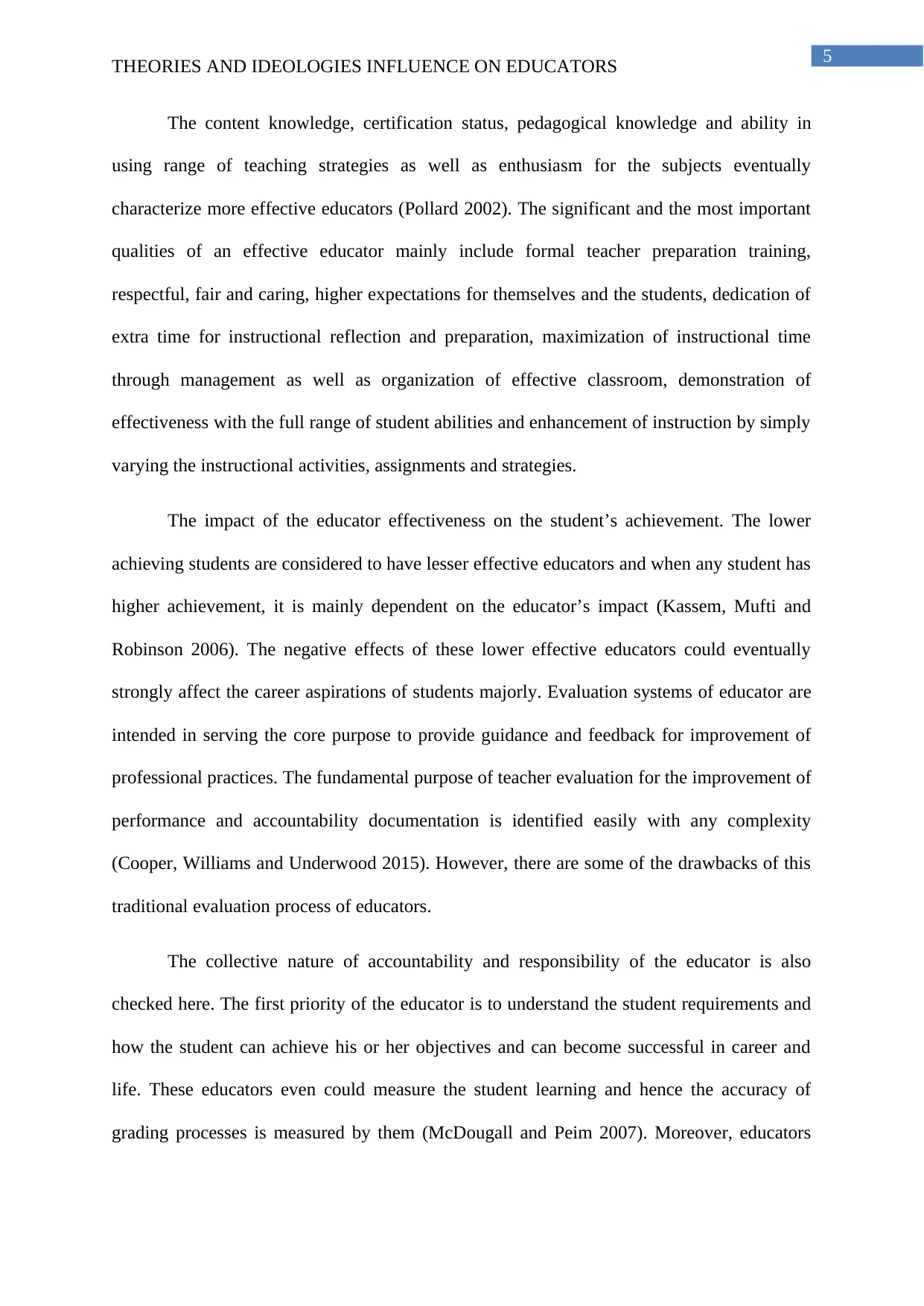
5
THEORIES AND IDEOLOGIES INFLUENCE ON EDUCATORS
The content knowledge, certification status, pedagogical knowledge and ability in
using range of teaching strategies as well as enthusiasm for the subjects eventually
characterize more effective educators (Pollard 2002). The significant and the most important
qualities of an effective educator mainly include formal teacher preparation training,
respectful, fair and caring, higher expectations for themselves and the students, dedication of
extra time for instructional reflection and preparation, maximization of instructional time
through management as well as organization of effective classroom, demonstration of
effectiveness with the full range of student abilities and enhancement of instruction by simply
varying the instructional activities, assignments and strategies.
The impact of the educator effectiveness on the student’s achievement. The lower
achieving students are considered to have lesser effective educators and when any student has
higher achievement, it is mainly dependent on the educator’s impact (Kassem, Mufti and
Robinson 2006). The negative effects of these lower effective educators could eventually
strongly affect the career aspirations of students majorly. Evaluation systems of educator are
intended in serving the core purpose to provide guidance and feedback for improvement of
professional practices. The fundamental purpose of teacher evaluation for the improvement of
performance and accountability documentation is identified easily with any complexity
(Cooper, Williams and Underwood 2015). However, there are some of the drawbacks of this
traditional evaluation process of educators.
The collective nature of accountability and responsibility of the educator is also
checked here. The first priority of the educator is to understand the student requirements and
how the student can achieve his or her objectives and can become successful in career and
life. These educators even could measure the student learning and hence the accuracy of
grading processes is measured by them (McDougall and Peim 2007). Moreover, educators
THEORIES AND IDEOLOGIES INFLUENCE ON EDUCATORS
The content knowledge, certification status, pedagogical knowledge and ability in
using range of teaching strategies as well as enthusiasm for the subjects eventually
characterize more effective educators (Pollard 2002). The significant and the most important
qualities of an effective educator mainly include formal teacher preparation training,
respectful, fair and caring, higher expectations for themselves and the students, dedication of
extra time for instructional reflection and preparation, maximization of instructional time
through management as well as organization of effective classroom, demonstration of
effectiveness with the full range of student abilities and enhancement of instruction by simply
varying the instructional activities, assignments and strategies.
The impact of the educator effectiveness on the student’s achievement. The lower
achieving students are considered to have lesser effective educators and when any student has
higher achievement, it is mainly dependent on the educator’s impact (Kassem, Mufti and
Robinson 2006). The negative effects of these lower effective educators could eventually
strongly affect the career aspirations of students majorly. Evaluation systems of educator are
intended in serving the core purpose to provide guidance and feedback for improvement of
professional practices. The fundamental purpose of teacher evaluation for the improvement of
performance and accountability documentation is identified easily with any complexity
(Cooper, Williams and Underwood 2015). However, there are some of the drawbacks of this
traditional evaluation process of educators.
The collective nature of accountability and responsibility of the educator is also
checked here. The first priority of the educator is to understand the student requirements and
how the student can achieve his or her objectives and can become successful in career and
life. These educators even could measure the student learning and hence the accuracy of
grading processes is measured by them (McDougall and Peim 2007). Moreover, educators
⊘ This is a preview!⊘
Do you want full access?
Subscribe today to unlock all pages.

Trusted by 1+ million students worldwide
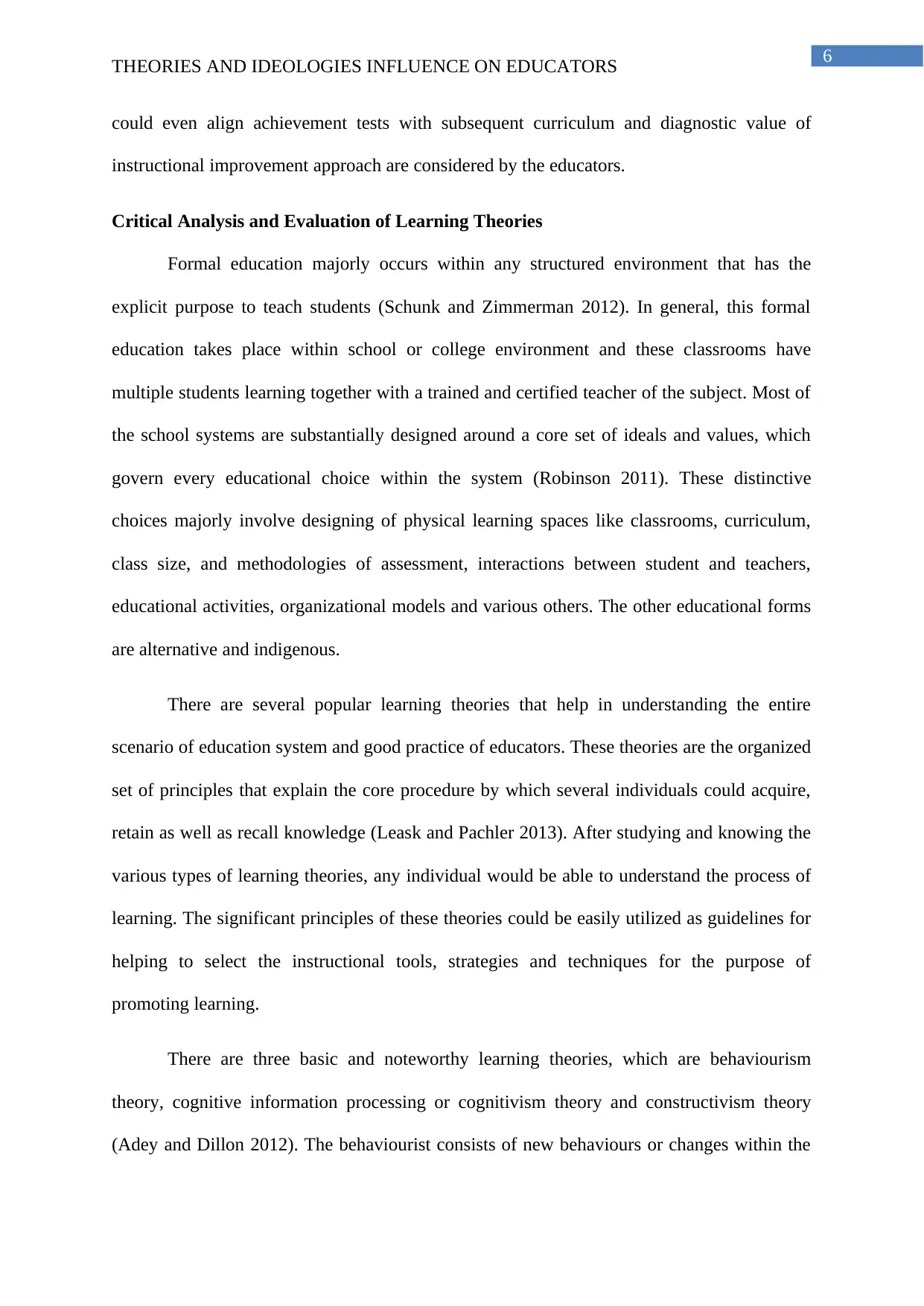
6
THEORIES AND IDEOLOGIES INFLUENCE ON EDUCATORS
could even align achievement tests with subsequent curriculum and diagnostic value of
instructional improvement approach are considered by the educators.
Critical Analysis and Evaluation of Learning Theories
Formal education majorly occurs within any structured environment that has the
explicit purpose to teach students (Schunk and Zimmerman 2012). In general, this formal
education takes place within school or college environment and these classrooms have
multiple students learning together with a trained and certified teacher of the subject. Most of
the school systems are substantially designed around a core set of ideals and values, which
govern every educational choice within the system (Robinson 2011). These distinctive
choices majorly involve designing of physical learning spaces like classrooms, curriculum,
class size, and methodologies of assessment, interactions between student and teachers,
educational activities, organizational models and various others. The other educational forms
are alternative and indigenous.
There are several popular learning theories that help in understanding the entire
scenario of education system and good practice of educators. These theories are the organized
set of principles that explain the core procedure by which several individuals could acquire,
retain as well as recall knowledge (Leask and Pachler 2013). After studying and knowing the
various types of learning theories, any individual would be able to understand the process of
learning. The significant principles of these theories could be easily utilized as guidelines for
helping to select the instructional tools, strategies and techniques for the purpose of
promoting learning.
There are three basic and noteworthy learning theories, which are behaviourism
theory, cognitive information processing or cognitivism theory and constructivism theory
(Adey and Dillon 2012). The behaviourist consists of new behaviours or changes within the
THEORIES AND IDEOLOGIES INFLUENCE ON EDUCATORS
could even align achievement tests with subsequent curriculum and diagnostic value of
instructional improvement approach are considered by the educators.
Critical Analysis and Evaluation of Learning Theories
Formal education majorly occurs within any structured environment that has the
explicit purpose to teach students (Schunk and Zimmerman 2012). In general, this formal
education takes place within school or college environment and these classrooms have
multiple students learning together with a trained and certified teacher of the subject. Most of
the school systems are substantially designed around a core set of ideals and values, which
govern every educational choice within the system (Robinson 2011). These distinctive
choices majorly involve designing of physical learning spaces like classrooms, curriculum,
class size, and methodologies of assessment, interactions between student and teachers,
educational activities, organizational models and various others. The other educational forms
are alternative and indigenous.
There are several popular learning theories that help in understanding the entire
scenario of education system and good practice of educators. These theories are the organized
set of principles that explain the core procedure by which several individuals could acquire,
retain as well as recall knowledge (Leask and Pachler 2013). After studying and knowing the
various types of learning theories, any individual would be able to understand the process of
learning. The significant principles of these theories could be easily utilized as guidelines for
helping to select the instructional tools, strategies and techniques for the purpose of
promoting learning.
There are three basic and noteworthy learning theories, which are behaviourism
theory, cognitive information processing or cognitivism theory and constructivism theory
(Adey and Dillon 2012). The behaviourist consists of new behaviours or changes within the
Paraphrase This Document
Need a fresh take? Get an instant paraphrase of this document with our AI Paraphraser
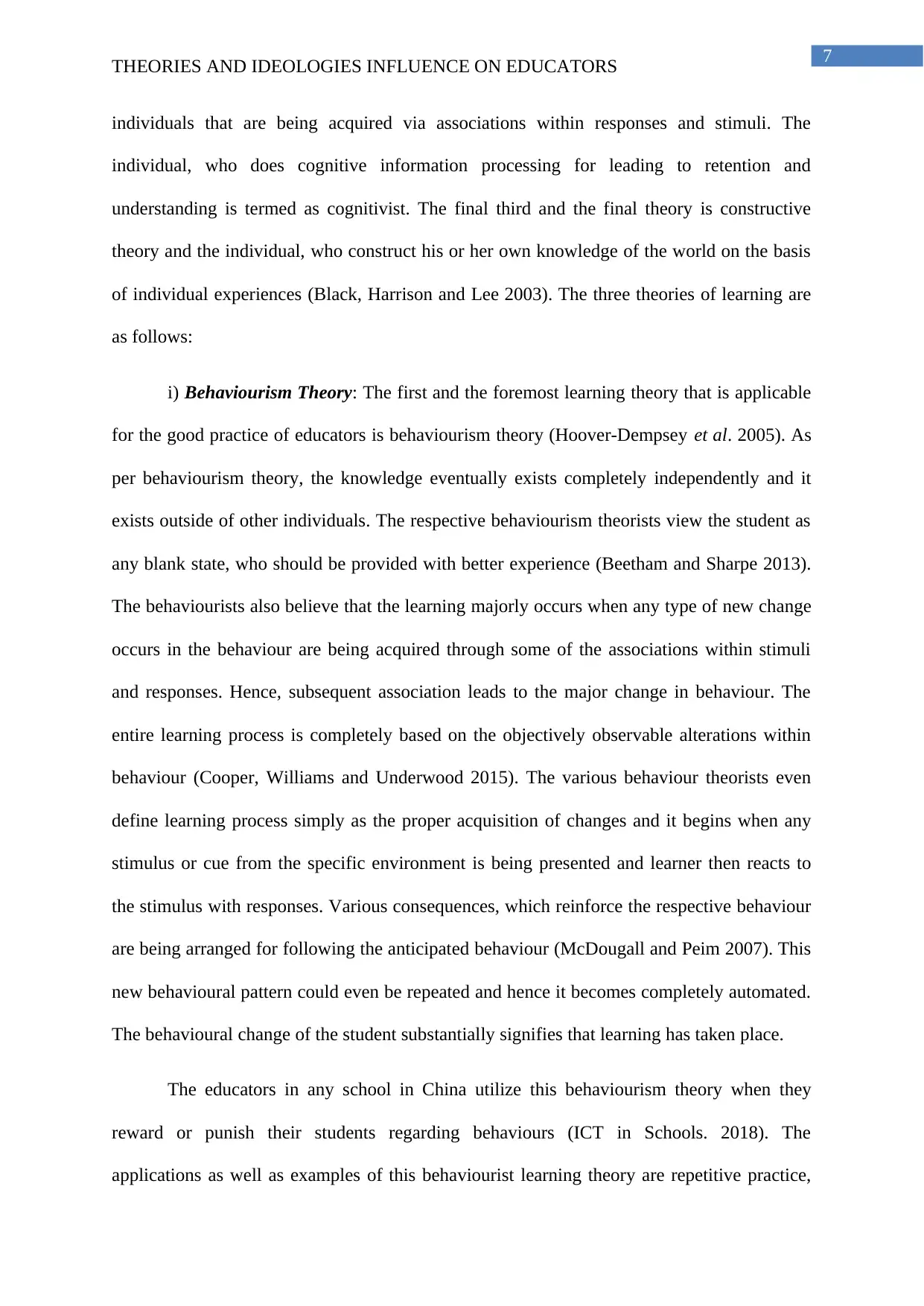
7
THEORIES AND IDEOLOGIES INFLUENCE ON EDUCATORS
individuals that are being acquired via associations within responses and stimuli. The
individual, who does cognitive information processing for leading to retention and
understanding is termed as cognitivist. The final third and the final theory is constructive
theory and the individual, who construct his or her own knowledge of the world on the basis
of individual experiences (Black, Harrison and Lee 2003). The three theories of learning are
as follows:
i) Behaviourism Theory: The first and the foremost learning theory that is applicable
for the good practice of educators is behaviourism theory (Hoover-Dempsey et al. 2005). As
per behaviourism theory, the knowledge eventually exists completely independently and it
exists outside of other individuals. The respective behaviourism theorists view the student as
any blank state, who should be provided with better experience (Beetham and Sharpe 2013).
The behaviourists also believe that the learning majorly occurs when any type of new change
occurs in the behaviour are being acquired through some of the associations within stimuli
and responses. Hence, subsequent association leads to the major change in behaviour. The
entire learning process is completely based on the objectively observable alterations within
behaviour (Cooper, Williams and Underwood 2015). The various behaviour theorists even
define learning process simply as the proper acquisition of changes and it begins when any
stimulus or cue from the specific environment is being presented and learner then reacts to
the stimulus with responses. Various consequences, which reinforce the respective behaviour
are being arranged for following the anticipated behaviour (McDougall and Peim 2007). This
new behavioural pattern could even be repeated and hence it becomes completely automated.
The behavioural change of the student substantially signifies that learning has taken place.
The educators in any school in China utilize this behaviourism theory when they
reward or punish their students regarding behaviours (ICT in Schools. 2018). The
applications as well as examples of this behaviourist learning theory are repetitive practice,
THEORIES AND IDEOLOGIES INFLUENCE ON EDUCATORS
individuals that are being acquired via associations within responses and stimuli. The
individual, who does cognitive information processing for leading to retention and
understanding is termed as cognitivist. The final third and the final theory is constructive
theory and the individual, who construct his or her own knowledge of the world on the basis
of individual experiences (Black, Harrison and Lee 2003). The three theories of learning are
as follows:
i) Behaviourism Theory: The first and the foremost learning theory that is applicable
for the good practice of educators is behaviourism theory (Hoover-Dempsey et al. 2005). As
per behaviourism theory, the knowledge eventually exists completely independently and it
exists outside of other individuals. The respective behaviourism theorists view the student as
any blank state, who should be provided with better experience (Beetham and Sharpe 2013).
The behaviourists also believe that the learning majorly occurs when any type of new change
occurs in the behaviour are being acquired through some of the associations within stimuli
and responses. Hence, subsequent association leads to the major change in behaviour. The
entire learning process is completely based on the objectively observable alterations within
behaviour (Cooper, Williams and Underwood 2015). The various behaviour theorists even
define learning process simply as the proper acquisition of changes and it begins when any
stimulus or cue from the specific environment is being presented and learner then reacts to
the stimulus with responses. Various consequences, which reinforce the respective behaviour
are being arranged for following the anticipated behaviour (McDougall and Peim 2007). This
new behavioural pattern could even be repeated and hence it becomes completely automated.
The behavioural change of the student substantially signifies that learning has taken place.
The educators in any school in China utilize this behaviourism theory when they
reward or punish their students regarding behaviours (ICT in Schools. 2018). The
applications as well as examples of this behaviourist learning theory are repetitive practice,

8
THEORIES AND IDEOLOGIES INFLUENCE ON EDUCATORS
verbal reinforcement like good job, and participation points, establishing rules, bonus points
and many more. This behaviourism instructions do not prepare the students for creative
thinking and problem solving. These students do what are being instructed to them and hence
they do not take any kind of initiative for changing or improving matters (Infed.org. 2018).
The students at Shen Waitlist International School in Shenzhen China. Being a grade 2
primary school teacher in this particular school, I have got proper understanding of the
influence of behaviourism learning theory on students and their educators. The students in
this school are then prepared for recall of the basic facts, performing tasks or automatic
responses. This specific learning theory subsequently focuses on the observable objective
behaviours and then discounts all types of independent activities of the mind (Black, Harrison
and Lee 2003). The various behaviour theorists have defined learning as nothing more than
the subsequent acquisition of the new behaviour on the basis of environmental conditions.
The experiments by behaviourists eventually identify conditioning as the universal learning
procedure.
Two different kinds of conditioning are present and each of these comprises of a
distinct behavioural pattern (Gardner 2006). The classic conditioning takes place when any
natural reflex in response to the stimulus. The most common examples of this classical
conditioning within the educational system is in situations, in which the students eventually
exhibit irrational anxieties and fears such as fear of public speaking, phobia of general school
and fear of failure. The second type of conditioning is the operant or behavioural
conditioning. This type conditioning takes place when any response to stimulus is reinforced
(Beetham and Sharpe 2013). This operant conditioning is the simplified feedback system, i.e.
if any reinforcement or reward is following the response to stimulus, this response then
becomes more predictable in future.
THEORIES AND IDEOLOGIES INFLUENCE ON EDUCATORS
verbal reinforcement like good job, and participation points, establishing rules, bonus points
and many more. This behaviourism instructions do not prepare the students for creative
thinking and problem solving. These students do what are being instructed to them and hence
they do not take any kind of initiative for changing or improving matters (Infed.org. 2018).
The students at Shen Waitlist International School in Shenzhen China. Being a grade 2
primary school teacher in this particular school, I have got proper understanding of the
influence of behaviourism learning theory on students and their educators. The students in
this school are then prepared for recall of the basic facts, performing tasks or automatic
responses. This specific learning theory subsequently focuses on the observable objective
behaviours and then discounts all types of independent activities of the mind (Black, Harrison
and Lee 2003). The various behaviour theorists have defined learning as nothing more than
the subsequent acquisition of the new behaviour on the basis of environmental conditions.
The experiments by behaviourists eventually identify conditioning as the universal learning
procedure.
Two different kinds of conditioning are present and each of these comprises of a
distinct behavioural pattern (Gardner 2006). The classic conditioning takes place when any
natural reflex in response to the stimulus. The most common examples of this classical
conditioning within the educational system is in situations, in which the students eventually
exhibit irrational anxieties and fears such as fear of public speaking, phobia of general school
and fear of failure. The second type of conditioning is the operant or behavioural
conditioning. This type conditioning takes place when any response to stimulus is reinforced
(Beetham and Sharpe 2013). This operant conditioning is the simplified feedback system, i.e.
if any reinforcement or reward is following the response to stimulus, this response then
becomes more predictable in future.
⊘ This is a preview!⊘
Do you want full access?
Subscribe today to unlock all pages.

Trusted by 1+ million students worldwide
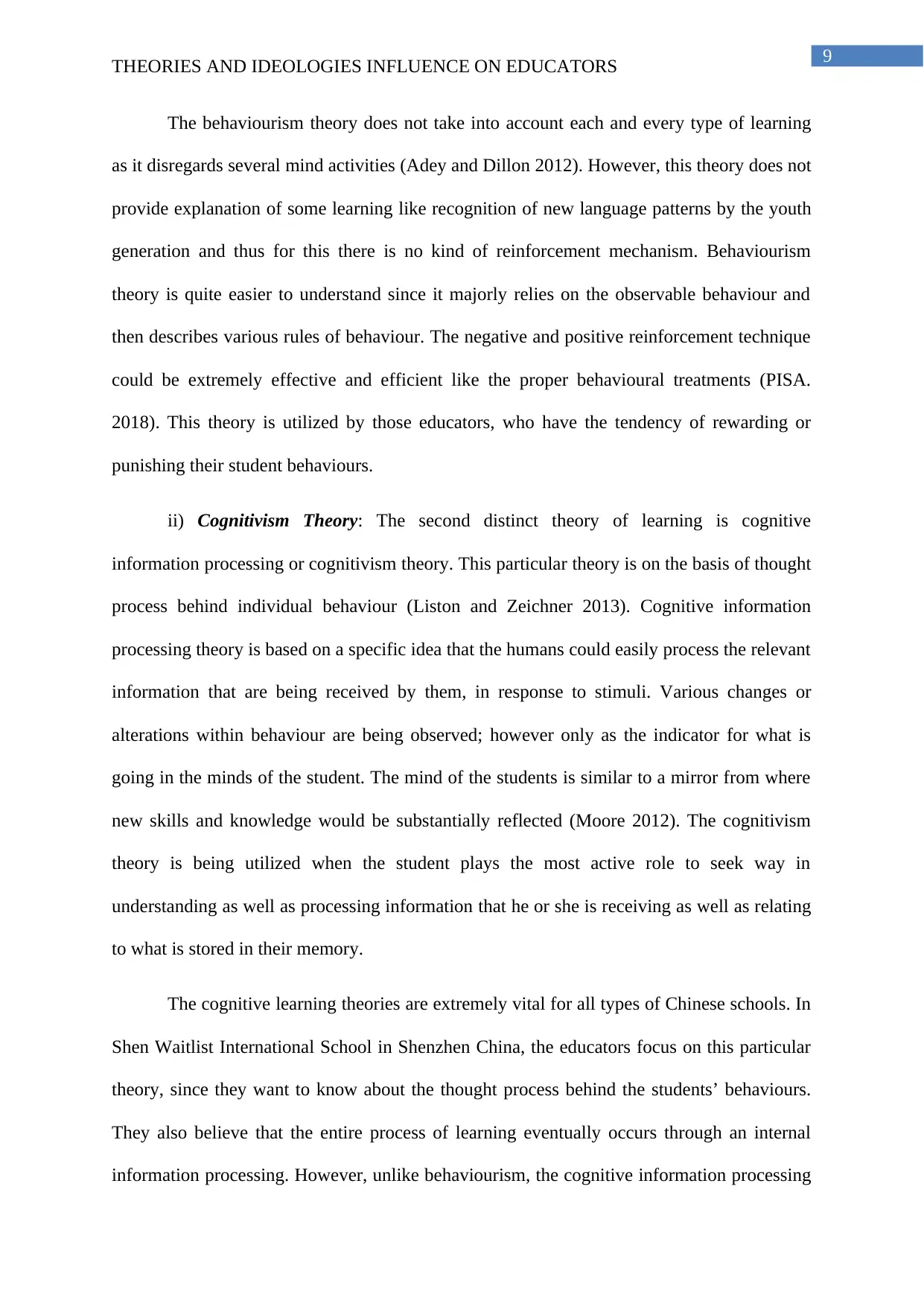
9
THEORIES AND IDEOLOGIES INFLUENCE ON EDUCATORS
The behaviourism theory does not take into account each and every type of learning
as it disregards several mind activities (Adey and Dillon 2012). However, this theory does not
provide explanation of some learning like recognition of new language patterns by the youth
generation and thus for this there is no kind of reinforcement mechanism. Behaviourism
theory is quite easier to understand since it majorly relies on the observable behaviour and
then describes various rules of behaviour. The negative and positive reinforcement technique
could be extremely effective and efficient like the proper behavioural treatments (PISA.
2018). This theory is utilized by those educators, who have the tendency of rewarding or
punishing their student behaviours.
ii) Cognitivism Theory: The second distinct theory of learning is cognitive
information processing or cognitivism theory. This particular theory is on the basis of thought
process behind individual behaviour (Liston and Zeichner 2013). Cognitive information
processing theory is based on a specific idea that the humans could easily process the relevant
information that are being received by them, in response to stimuli. Various changes or
alterations within behaviour are being observed; however only as the indicator for what is
going in the minds of the student. The mind of the students is similar to a mirror from where
new skills and knowledge would be substantially reflected (Moore 2012). The cognitivism
theory is being utilized when the student plays the most active role to seek way in
understanding as well as processing information that he or she is receiving as well as relating
to what is stored in their memory.
The cognitive learning theories are extremely vital for all types of Chinese schools. In
Shen Waitlist International School in Shenzhen China, the educators focus on this particular
theory, since they want to know about the thought process behind the students’ behaviours.
They also believe that the entire process of learning eventually occurs through an internal
information processing. However, unlike behaviourism, the cognitive information processing
THEORIES AND IDEOLOGIES INFLUENCE ON EDUCATORS
The behaviourism theory does not take into account each and every type of learning
as it disregards several mind activities (Adey and Dillon 2012). However, this theory does not
provide explanation of some learning like recognition of new language patterns by the youth
generation and thus for this there is no kind of reinforcement mechanism. Behaviourism
theory is quite easier to understand since it majorly relies on the observable behaviour and
then describes various rules of behaviour. The negative and positive reinforcement technique
could be extremely effective and efficient like the proper behavioural treatments (PISA.
2018). This theory is utilized by those educators, who have the tendency of rewarding or
punishing their student behaviours.
ii) Cognitivism Theory: The second distinct theory of learning is cognitive
information processing or cognitivism theory. This particular theory is on the basis of thought
process behind individual behaviour (Liston and Zeichner 2013). Cognitive information
processing theory is based on a specific idea that the humans could easily process the relevant
information that are being received by them, in response to stimuli. Various changes or
alterations within behaviour are being observed; however only as the indicator for what is
going in the minds of the student. The mind of the students is similar to a mirror from where
new skills and knowledge would be substantially reflected (Moore 2012). The cognitivism
theory is being utilized when the student plays the most active role to seek way in
understanding as well as processing information that he or she is receiving as well as relating
to what is stored in their memory.
The cognitive learning theories are extremely vital for all types of Chinese schools. In
Shen Waitlist International School in Shenzhen China, the educators focus on this particular
theory, since they want to know about the thought process behind the students’ behaviours.
They also believe that the entire process of learning eventually occurs through an internal
information processing. However, unlike behaviourism, the cognitive information processing
Paraphrase This Document
Need a fresh take? Get an instant paraphrase of this document with our AI Paraphraser
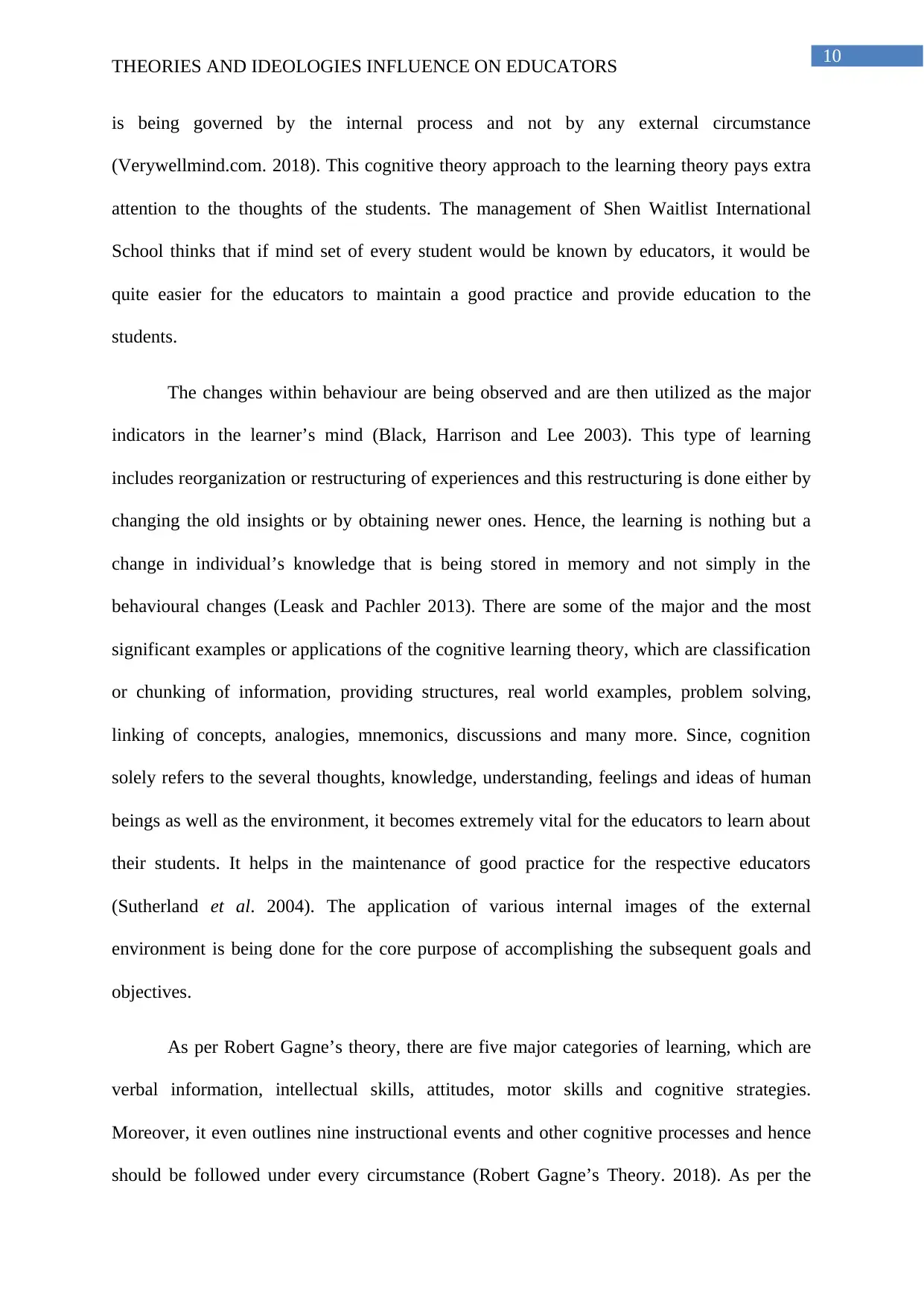
10
THEORIES AND IDEOLOGIES INFLUENCE ON EDUCATORS
is being governed by the internal process and not by any external circumstance
(Verywellmind.com. 2018). This cognitive theory approach to the learning theory pays extra
attention to the thoughts of the students. The management of Shen Waitlist International
School thinks that if mind set of every student would be known by educators, it would be
quite easier for the educators to maintain a good practice and provide education to the
students.
The changes within behaviour are being observed and are then utilized as the major
indicators in the learner’s mind (Black, Harrison and Lee 2003). This type of learning
includes reorganization or restructuring of experiences and this restructuring is done either by
changing the old insights or by obtaining newer ones. Hence, the learning is nothing but a
change in individual’s knowledge that is being stored in memory and not simply in the
behavioural changes (Leask and Pachler 2013). There are some of the major and the most
significant examples or applications of the cognitive learning theory, which are classification
or chunking of information, providing structures, real world examples, problem solving,
linking of concepts, analogies, mnemonics, discussions and many more. Since, cognition
solely refers to the several thoughts, knowledge, understanding, feelings and ideas of human
beings as well as the environment, it becomes extremely vital for the educators to learn about
their students. It helps in the maintenance of good practice for the respective educators
(Sutherland et al. 2004). The application of various internal images of the external
environment is being done for the core purpose of accomplishing the subsequent goals and
objectives.
As per Robert Gagne’s theory, there are five major categories of learning, which are
verbal information, intellectual skills, attitudes, motor skills and cognitive strategies.
Moreover, it even outlines nine instructional events and other cognitive processes and hence
should be followed under every circumstance (Robert Gagne’s Theory. 2018). As per the
THEORIES AND IDEOLOGIES INFLUENCE ON EDUCATORS
is being governed by the internal process and not by any external circumstance
(Verywellmind.com. 2018). This cognitive theory approach to the learning theory pays extra
attention to the thoughts of the students. The management of Shen Waitlist International
School thinks that if mind set of every student would be known by educators, it would be
quite easier for the educators to maintain a good practice and provide education to the
students.
The changes within behaviour are being observed and are then utilized as the major
indicators in the learner’s mind (Black, Harrison and Lee 2003). This type of learning
includes reorganization or restructuring of experiences and this restructuring is done either by
changing the old insights or by obtaining newer ones. Hence, the learning is nothing but a
change in individual’s knowledge that is being stored in memory and not simply in the
behavioural changes (Leask and Pachler 2013). There are some of the major and the most
significant examples or applications of the cognitive learning theory, which are classification
or chunking of information, providing structures, real world examples, problem solving,
linking of concepts, analogies, mnemonics, discussions and many more. Since, cognition
solely refers to the several thoughts, knowledge, understanding, feelings and ideas of human
beings as well as the environment, it becomes extremely vital for the educators to learn about
their students. It helps in the maintenance of good practice for the respective educators
(Sutherland et al. 2004). The application of various internal images of the external
environment is being done for the core purpose of accomplishing the subsequent goals and
objectives.
As per Robert Gagne’s theory, there are five major categories of learning, which are
verbal information, intellectual skills, attitudes, motor skills and cognitive strategies.
Moreover, it even outlines nine instructional events and other cognitive processes and hence
should be followed under every circumstance (Robert Gagne’s Theory. 2018). As per the
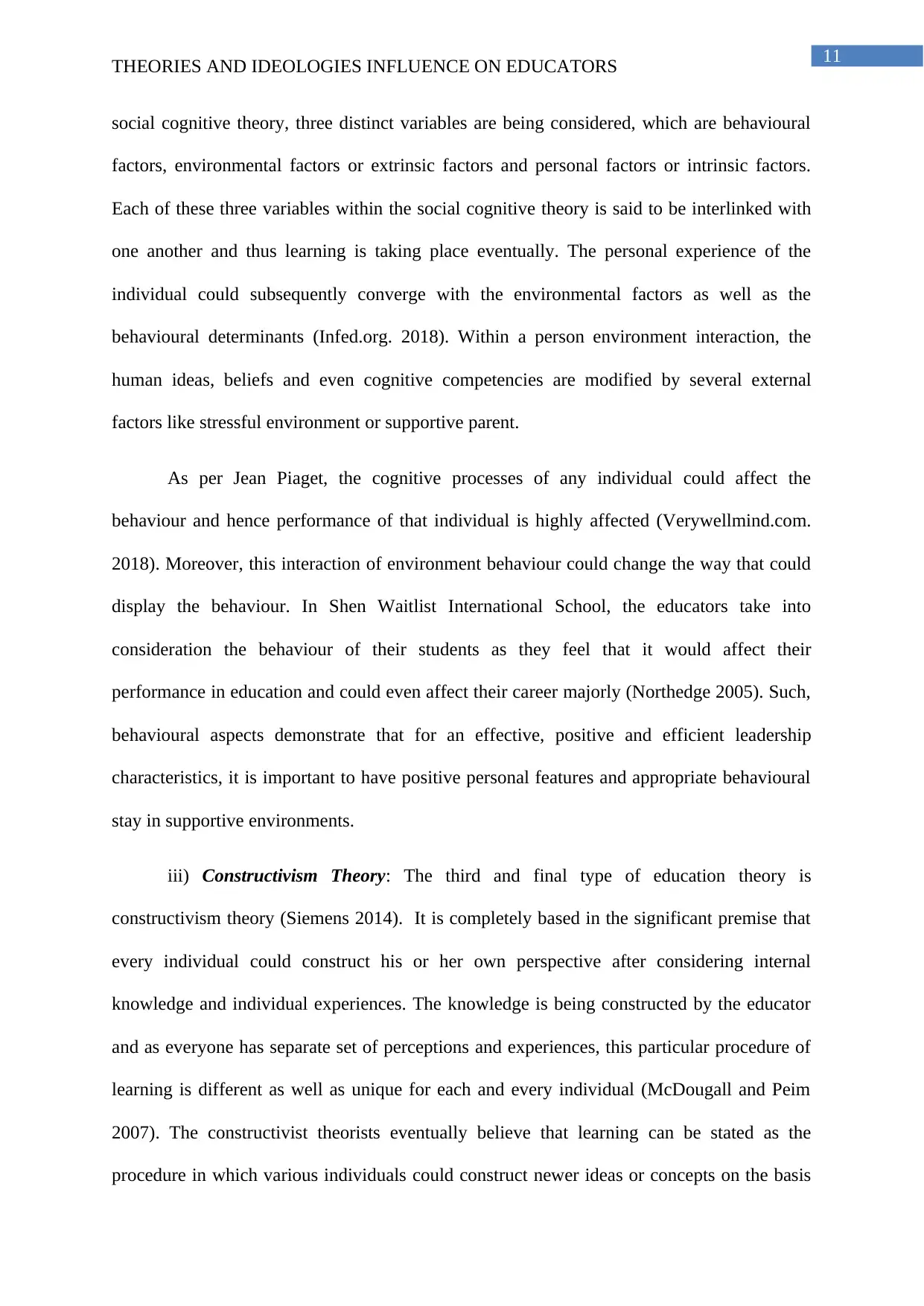
11
THEORIES AND IDEOLOGIES INFLUENCE ON EDUCATORS
social cognitive theory, three distinct variables are being considered, which are behavioural
factors, environmental factors or extrinsic factors and personal factors or intrinsic factors.
Each of these three variables within the social cognitive theory is said to be interlinked with
one another and thus learning is taking place eventually. The personal experience of the
individual could subsequently converge with the environmental factors as well as the
behavioural determinants (Infed.org. 2018). Within a person environment interaction, the
human ideas, beliefs and even cognitive competencies are modified by several external
factors like stressful environment or supportive parent.
As per Jean Piaget, the cognitive processes of any individual could affect the
behaviour and hence performance of that individual is highly affected (Verywellmind.com.
2018). Moreover, this interaction of environment behaviour could change the way that could
display the behaviour. In Shen Waitlist International School, the educators take into
consideration the behaviour of their students as they feel that it would affect their
performance in education and could even affect their career majorly (Northedge 2005). Such,
behavioural aspects demonstrate that for an effective, positive and efficient leadership
characteristics, it is important to have positive personal features and appropriate behavioural
stay in supportive environments.
iii) Constructivism Theory: The third and final type of education theory is
constructivism theory (Siemens 2014). It is completely based in the significant premise that
every individual could construct his or her own perspective after considering internal
knowledge and individual experiences. The knowledge is being constructed by the educator
and as everyone has separate set of perceptions and experiences, this particular procedure of
learning is different as well as unique for each and every individual (McDougall and Peim
2007). The constructivist theorists eventually believe that learning can be stated as the
procedure in which various individuals could construct newer ideas or concepts on the basis
THEORIES AND IDEOLOGIES INFLUENCE ON EDUCATORS
social cognitive theory, three distinct variables are being considered, which are behavioural
factors, environmental factors or extrinsic factors and personal factors or intrinsic factors.
Each of these three variables within the social cognitive theory is said to be interlinked with
one another and thus learning is taking place eventually. The personal experience of the
individual could subsequently converge with the environmental factors as well as the
behavioural determinants (Infed.org. 2018). Within a person environment interaction, the
human ideas, beliefs and even cognitive competencies are modified by several external
factors like stressful environment or supportive parent.
As per Jean Piaget, the cognitive processes of any individual could affect the
behaviour and hence performance of that individual is highly affected (Verywellmind.com.
2018). Moreover, this interaction of environment behaviour could change the way that could
display the behaviour. In Shen Waitlist International School, the educators take into
consideration the behaviour of their students as they feel that it would affect their
performance in education and could even affect their career majorly (Northedge 2005). Such,
behavioural aspects demonstrate that for an effective, positive and efficient leadership
characteristics, it is important to have positive personal features and appropriate behavioural
stay in supportive environments.
iii) Constructivism Theory: The third and final type of education theory is
constructivism theory (Siemens 2014). It is completely based in the significant premise that
every individual could construct his or her own perspective after considering internal
knowledge and individual experiences. The knowledge is being constructed by the educator
and as everyone has separate set of perceptions and experiences, this particular procedure of
learning is different as well as unique for each and every individual (McDougall and Peim
2007). The constructivist theorists eventually believe that learning can be stated as the
procedure in which various individuals could construct newer ideas or concepts on the basis
⊘ This is a preview!⊘
Do you want full access?
Subscribe today to unlock all pages.

Trusted by 1+ million students worldwide
1 out of 21
Related Documents
Your All-in-One AI-Powered Toolkit for Academic Success.
+13062052269
info@desklib.com
Available 24*7 on WhatsApp / Email
![[object Object]](/_next/static/media/star-bottom.7253800d.svg)
Unlock your academic potential
Copyright © 2020–2026 A2Z Services. All Rights Reserved. Developed and managed by ZUCOL.





